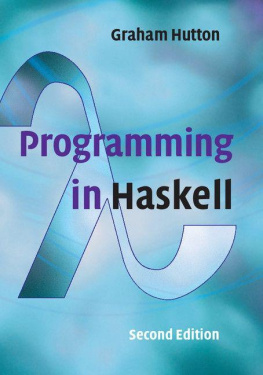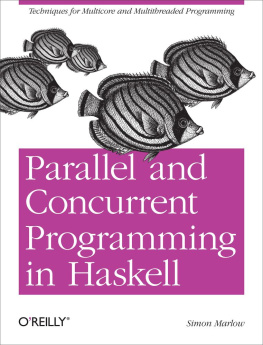Alejandro Serrano Mena - Beginning Haskell: A Project-Based Approach
Here you can read online Alejandro Serrano Mena - Beginning Haskell: A Project-Based Approach full text of the book (entire story) in english for free. Download pdf and epub, get meaning, cover and reviews about this ebook. year: 2014, publisher: Apress, genre: Home and family. Description of the work, (preface) as well as reviews are available. Best literature library LitArk.com created for fans of good reading and offers a wide selection of genres:
Romance novel
Science fiction
Adventure
Detective
Science
History
Home and family
Prose
Art
Politics
Computer
Non-fiction
Religion
Business
Children
Humor
Choose a favorite category and find really read worthwhile books. Enjoy immersion in the world of imagination, feel the emotions of the characters or learn something new for yourself, make an fascinating discovery.
- Book:Beginning Haskell: A Project-Based Approach
- Author:
- Publisher:Apress
- Genre:
- Year:2014
- Rating:4 / 5
- Favourites:Add to favourites
- Your mark:
Beginning Haskell: A Project-Based Approach: summary, description and annotation
We offer to read an annotation, description, summary or preface (depends on what the author of the book "Beginning Haskell: A Project-Based Approach" wrote himself). If you haven't found the necessary information about the book — write in the comments, we will try to find it.
Beginning Haskell provides a broad-based introduction to the Haskell language, its libraries and environment, and to the functional programming paradigm that is fast growing in importance in the software industry. The book takes a project-based approach to learning the language that is unified around the building of a web-based storefront. Excellent coverage is given to the Haskell ecosystem and supporting tools. These include the Cabal build tool for managing projects and modules, the HUnit and QuickCheck tools for software testing, the Scotty framework for developing web applications, Persistent and Esqueleto for database access, and also parallel and distributed programming libraries.
Functional programming is gathering momentum, allowing programmers to express themselves in a more concise way, reducing boilerplate and increasing the safety of code. Indeed, mainstream languages such as C# and Java are adopting features from functional programming, and from languages implementing that paradigm. Haskell is an elegant and noise-free pure functional language with a long history, having a huge number of library contributors and an active community. This makes Haskell the best tool for both learning and applying functional programming, and Beginning Haskell the perfect book to show off the language and what it can do.
- Takes you through a series of projects showing the different parts of the language.
- Provides an overview of the most important libraries and tools in the Haskell ecosystem.
- Teaches you how to apply functional patterns in real-world scenarios.
- Build small and large projects using the Haskell language.
- Profit from ecosystem tools such as Cabal, HLint, and QuickCheck.
- Implement efficient stream I/O via libraries like Conduit.
- Parallelize code to run on multiple processors or distributed across a network.
- Create domain-specific languages useable by business users, and to tackle specific problem domains.
- Build Haskell-backed websites using database and web-application libraries such as Persistent, Esqueleto, and Scotty
Beginning Haskell is for programmers new to functional programming, who want to learn this new paradigm and how it can improve the quality of their code. Beginning Haskell is also a great choice for functional programmers wanting to get a taste of the Haskell ecosystem and its unique features, or who wish to learn about advanced type system features and patterns.
Table of ContentsPart I: First Steps
1. Going Functional
2. Declaring the Data Model
3. Reusing Code through Lists
4. Using Containers and Type Classes
5. Laziness and Infinite Structures
Part II: Data Mining
6. Knowing Your Clients Using Monads
7. More Monads: Now for Recommendations
8. Parallelizing the Execution
Part III: Resource Handling
9. Dealing with Files: IO and Conduit
10. Builders and Parsers
11. Safe Database Access
12. Web Applications
Part IV: Domain Specific Languages
13. Strong Types
14. Attribute Grammars
Part V: Engineering the Store
15. Documenting, Testing, and Verifying
16. Architecting Your Application
Alejandro Serrano Mena: author's other books
Who wrote Beginning Haskell: A Project-Based Approach? Find out the surname, the name of the author of the book and a list of all author's works by series.

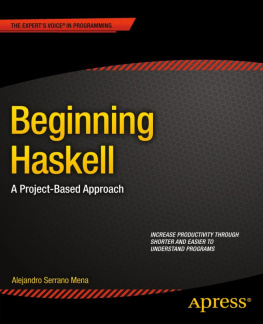

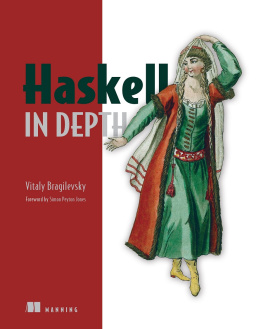
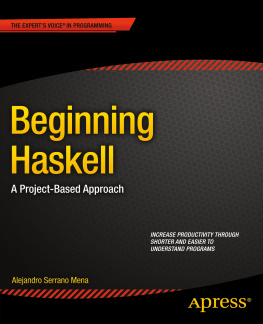
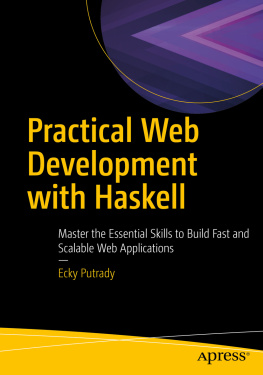

![Will Kurt [Will Kurt] - Get Programming with Haskell](/uploads/posts/book/116897/thumbs/will-kurt-will-kurt-get-programming-with-haskell.jpg)
